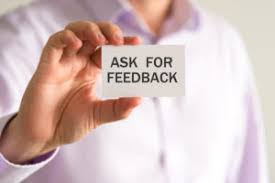Blog on Ask for Feedback Training
Asking for feedback is an essential skill that everyone should learn. Feedback is crucial in personal and professional growth, and it helps you identify areas of improvement and potential blind spots that you may have missed. However, asking for feedback can be daunting, as it requires vulnerability and openness to constructive criticism. In this blog, we'll discuss why feedback is essential, how to ask for feedback, and how to use it to improve yourself.
Why is feedback essential?
Feedback is essential because it allows us to improve and grow. Without feedback, we wouldn't know if we were doing something well or if we needed to improve. Feedback helps us identify areas where we can improve our skills, knowledge, and behaviors. Moreover, it allows us to gain insights into how others perceive us and the impact we have on them.
Asking for feedback can be uncomfortable, especially if you fear criticism or rejection. However, it's essential to remember that feedback is not personal. It's about your actions, behaviors, or performance, and it's an opportunity to improve.
How to ask for feedback?
Asking for feedback can be nerve-wracking, but there are some ways to make it easier. Here are some tips to help you ask for feedback effectively:
1.Be specific: Be clear about what you want feedback on. For example, if you're working on a project, ask for feedback on a particular aspect of the project, such as the design, the content, or the presentation.
2.Choose the right time and place: Make sure the timing and the setting are appropriate for the feedback. If you're asking for feedback on a presentation, ask for it after the presentation is over, and find a quiet place to talk.
3.Be open-minded: Be open to feedback, both positive and negative. Remember that feedback is an opportunity to learn and improve.
4.Ask open-ended questions: Ask open-ended questions that encourage the other person to provide detailed feedback. For example, instead of asking, "Did you like the presentation?" ask, "What did you think of the presentation?"
5.Thank the person: Remember to thank the person for their feedback. Let them know that you appreciate their input and that you will use it to improve.
How to use feedback to improve?
Receiving feedback is just the first step. To make the most of it, you need to use it to improve yourself. Here are some tips to help you use feedback effectively:
1.Listen carefully: Listen to the feedback carefully and try to understand it. Don't be defensive or dismissive.
2.Analyze the feedback: Take time to analyze the feedback and identify patterns or areas of improvement.
3.Develop a plan: Once you've identified areas of improvement, develop a plan to address them. Set specific goals and create a timeline for achieving them.
4.Take action: Take action on your plan and make changes accordingly.
5.Ask for follow-up feedback: Ask for follow-up feedback to see if your changes have made a difference.
Conclusion:
Feedback is essential for personal and professional growth. Asking for feedback can be uncomfortable, but it's essential to remember that feedback is not personal. It's an opportunity to learn and improve. By being specific, choosing the right time and place, being open-minded, asking open-ended questions, and thanking the person, you can ask for feedback effectively. To make the most of feedback, you need to listen carefully, analyze it, develop a plan, take action, and ask for follow-up feedback. Remember that feedback is a gift that can help you improve and grow.



Comments
Post a Comment
Thank you for your valuable feedback